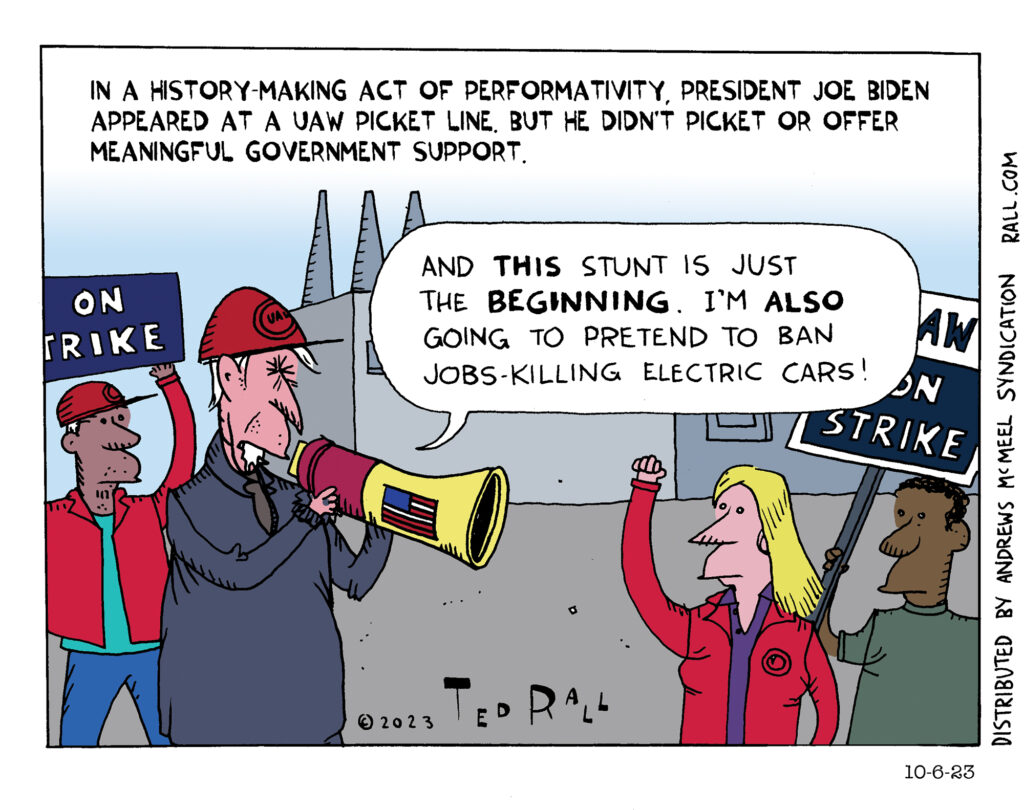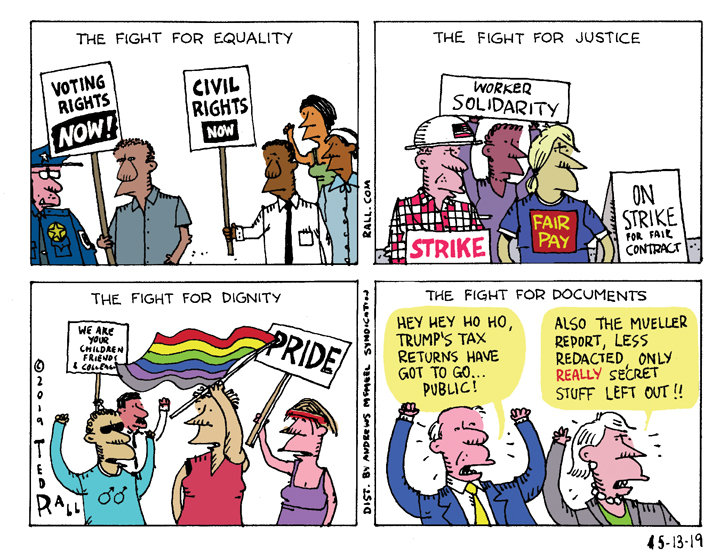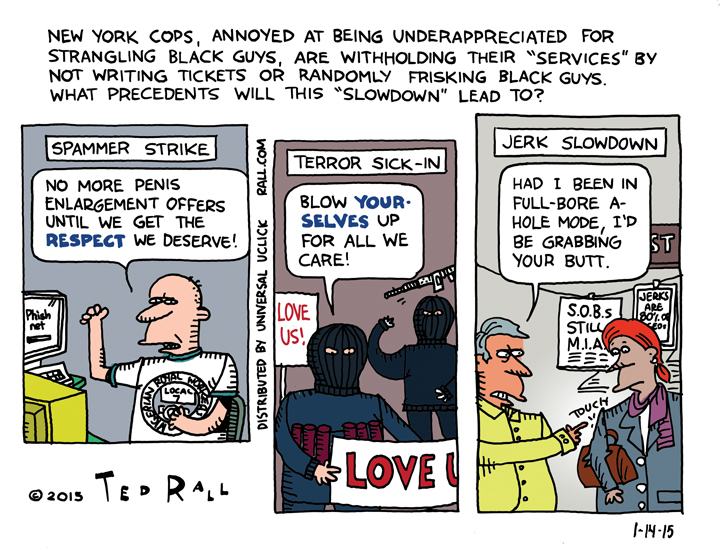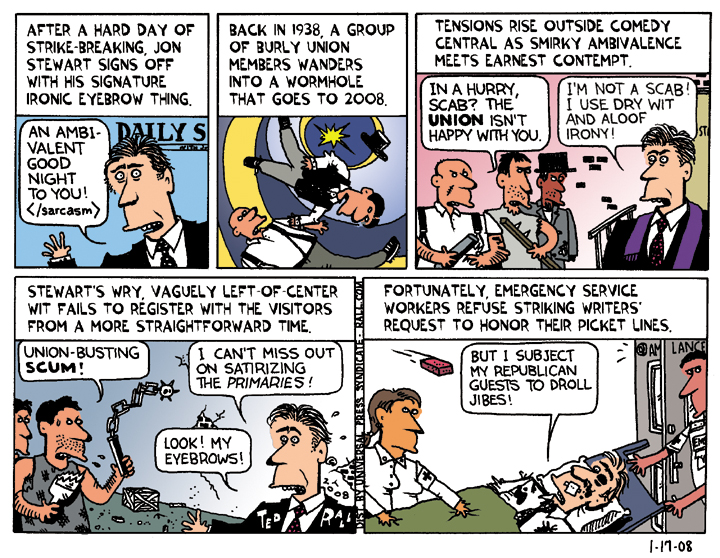In a history-making act of performativeness, President Joe Biden appeared at a UAW picket line. But he didn’t picket or offer meaningful government support.
DMZ America Podcast 71: A Look Behind the Looming Freight Railroad Strike
Freight-train conductor Toby Kemp joins political cartoonists Ted Rall (Left) and Scott Stantis (Right) for a behind-the-scenes look at life for railroad workers in the run-up to a likely national rail transport workers strike next month. Between 30% and 40% of all freight moves via rail, so a strike would cause major supply-chain disruptions as the country faces down higher interest rates and an OPEC-led oil shock. Rall and Stantis discuss the political and economic implications while Kemp provides a fascinating look at an important sector of the workforce that often gets ignored.
The American Left Moves on from One Great Struggle to Another
We used to fight for great things. Noble things. Now look at us. What Democrats want these days is a look at Trump’s tax returns and the unredacted version of the Robert Mueller Report. Not that there’s anything wrong with trying to get those documents. Transparency is important. But they’re hardly talking about the great issues of our time like poverty, the retirement crisis or ecocide.
The Greatest Projects I Never Made (Part 1 of 2)

She was a terrible boss. But she was wise about work. “We are defined more by the business we refuse to take than the ones we do,” she told me. That turned out to be true. My cartoons are notable for what they don’t include: symbols like donkeys and elephants, labeled graphic metaphors, a reliance on caricature.
Film fanatics muse about the Greatest Movies Never Made. There was talk about remaking John Carpenter’s campy, low-budget, politically brilliant 1988 movie “They Live.” Unlike Harrison Ford’s oafish 1995 do-over of “Sabrina”—first rule of Hollywood should be don’t remake a film by Billy Wilder—“They Live” with money for special effects and real actors might have been something to see.
Projects that get dropped before completion reveal the outer limits of a creator’s interests. Ideas intriguing enough to pursue initially and fall apart in the face of financial or marketplace distribution issues or other, easier-to-finish plans present a tantalizing portrait of a career that might have been under different circumstances.
I’ve been slogging through a midlife crisis. Court battles, career pains and my mother’s flagging health have me focused on mortality. For a poor kid from the Rust Belt I’ve lived an amazing life; if I die today I’ll feel that I scored a better deal than many others. Still, to whine is human. Closer to death than birth, I’m considering how to spend the time I have left and regretting cool things I never got to do and probably never will: work on staff inside the offices of a newspaper or magazine, study toward a master’s degree, teach, live or study overseas.
As a project-oriented creator I think even more about specific projects that, for whatever reason, never worked out. Call them: Ted Rall’s Greatest Projects Never Made.
I got close to newspaper staff jobs several times. The editor at the Saint Louis Post-Dispatch admired my cartoons but said she didn’t think her readers wanted to swallow the graphic equivalent of “ground glass with their breakfast every morning.” The Newark Star-Ledger passed me over for a recent college grad on the grounds that “it’ll be easier to tell a kid what to do.”
The Sacramento Bee flew me out for a decidedly unimpressive interview, putting me up at a motel whose view was an endless parade of homeless men pushing shopping carts. I knew the fix was in when I saw Rex Babin’s latest cartoon on the editor’s desk, not mine. They hired Rex. Anyway, the editor informed me that my caustic cartoons “might be too upsetting to the good burghers of Sacramento.” At the Harrisburg Patriot-News the fault was mine. They asked how much I wanted and I told them ($80,000 if memory serves). They hired another sportswriter instead. Two decades later, the cartooning job is still vacant.
Then there was the Asbury Park Press. I’d been schlepping down the Jersey shore from NYC for more than a year to draw about local and state politics. Finally the day I had been waiting for arrived: the big interview. Ray Ollwerther and I talked for an hour. Everything went smoothly until the executive editor’s last question. Gesturing to a window that overlooked the parking lot, he asked: “Will I ever look out there and see someone protesting something that you drew?” Honest to a career-suicide fault, I said, “I don’t know. Maybe.” As at the Ledger, they hired a young guy instead.
In the 1980s, in my twenties, I was desperately poor and viciously ambitious, a combination that opens one to a certain moral flexibility. I hated my life as a low-level banker. Why not sell out? Which is how I found myself being treated to lunch at the Four Seasons by Priscilla Buckley, editor of the archconservative National Review.
You may wonder why I include NR on this list. I obviously didn’t belong there. Because the money would have been great. And I would have loved to have worked with Buckley. Republican she was, and also an excellent human: witty, incredibly intelligent, kind. I left with instructions to draw 12 cartoons from a right-wing point of view.
I agonized. The poor: it’s their own fault. Reagan, we’re lucky to have him. We ought to have more wars. I couldn’t do it. Not because it made me feel evil—it was simply that none of it was true and there is no satire without underlying truth. I ducked Priscilla’s calls and she soon gave up.
Morals entered the equation in late 1990 when the New York Daily News went on strike. It was a brutal labor battle. Newsstands that sold the scab paper got torched; a strikebreaking delivery truck driver was shot at or shot, I don’t remember which. Along with every other newspaper, the News had been on my mailing list so that’s how they came to call me about a cartooning position at what was then America’s largest circulation newspaper. The editor offered me $120,000 at a time when I had zero prospects. I was a 28-year-old college senior, with no income and the same amount of financial aid, about to graduate into a tough recession. Editorials, not just at the News, portrayed the strikers as spoiled overpaid brats, but the offer bothered me. So I called my mom.
Uncharacteristically, she listened carefully without interrupting. “I didn’t raise a son,” she said simply, “to cross a picket line.” She was a teachers’ union shop steward. That was that.
We’re defined by what we refuse to do. But whenever I’ve worried about money, I wished I hadn’t called mom.
Next week: the really weird stuff I never did.
(Ted Rall, the cartoonist, columnist and graphic novelist, is the author of “Francis: The People’s Pope.” You can support Ted’s hard-hitting political cartoons and columns and see his work first by sponsoring his work on Patreon.)
Cartoon for January 17
Jon Stewart and Stephen Colbert are scabs. If Americans who work had one tenth of the guts and integrity of their counterparts in other countries, they’d refuse to tune into their shows. That also goes for when, and if, the Writers Guild strike is finished. Once a scab, always a scab.
These two strike-breakers think they can justify their actions away with the sort of lame arguments they usually get paid to mock when politicians make them. Let’s take them one at a time:
1. Their staffers were in danger of losing their jobs if they didn’t come back on the air. That’s true. It could happen. It’s called collateral damage, and it sucks. It’s also called solidarity. For all of us to get ahead, we all have to pull together and suck up the hard times. The whole point of a strike is to cause enough inconvenience to force management to negotiate in good faith. If Comedy Central ordered Stewart and Colbert back on the air, they ought to have quit. That’s called integrity.
2. They’re talking a lot on the air about unionism and the strike. While that’s very meta, it doesn’t wash. The best way to make sure the corporate bosses feel the pinch would have been to stay off the air.
3. They were willing to strike separate deals with the Writers Guild. First and foremost, the Guild ought not to have negotiated separately with Jay Leno. One deal for everybody, or no deal. Nothing else works. As for Colbert and Stewart, they didn’t strike an agreement with the Guild. “Wanting” to is a laaaaaaame counter to this fact.
Today’s cartoon is a two-parter of sorts. Fellow Cartoonist with Attitude Matt Bors offers his take on Stephen Colbert. Check it out!
Click on the cartoon to make it bigger.





